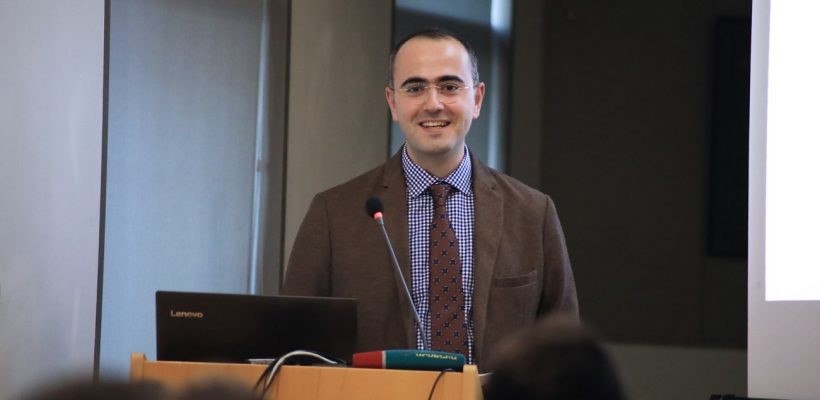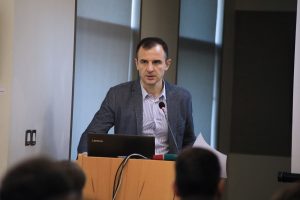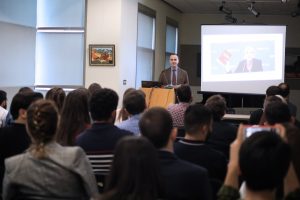
PSIA Book Talk and Seminar: Populism in Foreign Policy Making
3 min readYEREVAN, Armenia – On October 3, 2019, the American University of Armenia (AUA) Political Science and International Affairs (PSIA) program held a book talk and seminar with PSIA Adjunct Lecturer Dr. Hovhannes Nikoghosyan. The seminar focused on Populism in Foreign Policy Making and was based on the New York Times bestseller “What Is Populism?” authored by Princeton University Professor Jan-Werner Müller and its Armenian translation by Dr. Nikoghosyan recently released by Newmag publishing house.
 In his opening remarks, PSIA Program Chair Associate Professor Dr. Vahram Ter-Matevosyan mentioned that “the word populism has become a buzzword for the last couple of years and starting from the last year it became part of the Armenian political vocabulary.” Recently, a number of books have been published on populism, however, Dr. Ter-Matevosyan highlighted several points that make this particular book relevant to our times. Firstly, “What Is Populism?” is one of the first books on this topic released in Armenian, and secondly, it is a high-quality translation that truly conveys the content of the original. Dr. Ter-Matevosyan then congratulated his colleague Dr. Nikoghosyan for this relevant public service, and invited him to take the floor.
In his opening remarks, PSIA Program Chair Associate Professor Dr. Vahram Ter-Matevosyan mentioned that “the word populism has become a buzzword for the last couple of years and starting from the last year it became part of the Armenian political vocabulary.” Recently, a number of books have been published on populism, however, Dr. Ter-Matevosyan highlighted several points that make this particular book relevant to our times. Firstly, “What Is Populism?” is one of the first books on this topic released in Armenian, and secondly, it is a high-quality translation that truly conveys the content of the original. Dr. Ter-Matevosyan then congratulated his colleague Dr. Nikoghosyan for this relevant public service, and invited him to take the floor.
Dr. Nikoghosyan started the presentation by introducing the main arguments in the book, followed by his analysis of the impact of populist politicians on the making of foreign policy in various states, including Hungary, the UK, the U.S., Venezuela, Poland, etc.
According to the speaker, in public discourse politicians are sometimes characterized as populists in the sense of ‘demagoguery’ and without much differentiation from what makes politicians populists. Dr. Nikoghosyan noted that the intellectual approach requires looking to populism in the context of internal developments; basically, in the period triggered by and following the 2008-09 international financial crisis, growing unemployment, widening inequality gap, and the rise of social networks have gradually divided and polarized Western societies. The manifestation of the breakdown of societies and the domestic political landscape in the ‘first world’ has been the Occupy movement since 2011 with a slogan so similar to that of populists of current times: “We are the 99%.”
The fundamental claim that Muller makes in the book is that “populists are antipluralist,” they are against institutions, against checks and balances, against an independent judiciary and the media, they “occupy the state” and benefit their incompetent supporters because they claim to be “the one and only, exclusive representative of the real people” and they know what “the people” want without reliance on intermediaries. Populists claim to know what “the real people” want and therefore any opposition to that is illegitimate. Such a claim and emanating populist policies undermine democracy and are incongruous with their proclaimed aspirations.
The speaker explained that the support of populism has common features worldwide. Whether in Europe or the U.S., according to Dr. Nikoghosyan, supporters of populist politicians mostly have low income and are less educated.
 “In foreign policy populists focus on ‘process’ rather than ‘outcome,’ since they always feel the need to satisfy their constituencies. They prefer fanfare and not hardcore pursuit of foreign policy making. In the Western hemisphere they fight against American influence (Venezuela, Ecuador, Bolivia), in Europe they fight against Brussels (Le Pen, Orban, Kaczyński, Boris Johnson and Nigel Farage, Beppe Grillo, Mateo Salvini, etc.) and all that in the name of protecting national sovereignty, as claimed. This substantiates the argument that ‘foreign policy begins at home’ and moves forward the campaign against the elite,” remarked Dr. Nikoghosyan.
“In foreign policy populists focus on ‘process’ rather than ‘outcome,’ since they always feel the need to satisfy their constituencies. They prefer fanfare and not hardcore pursuit of foreign policy making. In the Western hemisphere they fight against American influence (Venezuela, Ecuador, Bolivia), in Europe they fight against Brussels (Le Pen, Orban, Kaczyński, Boris Johnson and Nigel Farage, Beppe Grillo, Mateo Salvini, etc.) and all that in the name of protecting national sovereignty, as claimed. This substantiates the argument that ‘foreign policy begins at home’ and moves forward the campaign against the elite,” remarked Dr. Nikoghosyan.
The presentation was followed by a Q&A session, during which the audience had the opportunity to seek elaborations on some key arguments made and their overall impact on the foreign policy of states led by populist leaders.
The Political Science and International Affairs (PSIA) program of the American University of Armenia (AUA) equips students with advanced analytical reasoning, critical thinking, and communication skills through the study of political science and international affairs, emphasizing local and global perspectives and practical applications of theory. The program provides world-class teaching and research, producing graduates who can best contribute to the development of the nation.
Media Coverage:
[ArmeniaTV News] Ինչ է պոպուլիզմը. Գրքի թարգմանիչ Հովհաննես Նիկողոսյանը խոսել է պոպուլիզմի մերօրյա դրսևորման մասին
